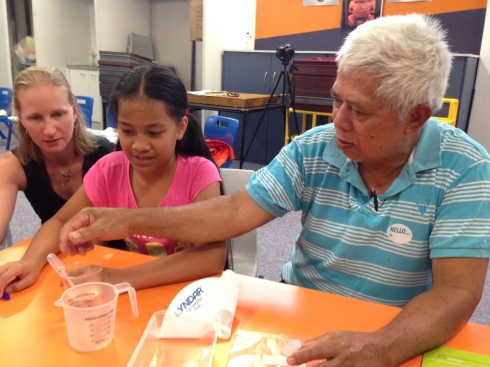In her spare time Ashleigh Fox, a Technical Officer in Biological Anthropology, works on an ambitious project: to raise science capital in New Zealand families by empowering adults to talk about science with their children.
Supported by the MBIE Curious Minds contestable fund since 2014, she has led a small team of Futureintech ambassadors to run pilot workshops at five Auckland schools: Onepoto Primary School, Beach Haven Primary School, Target Road Primary School and Robertson Road School.
This year she has started enlisting the help of Engineering and Science students from the University of Auckland.
The project applies the FEAST framework for the delivery of science and technology concepts, in an environment that allows participants to have fun, to question, and to share and gain knowledge for themselves and with each other, all while actively performing a scientific technique.
"We also use dress-up role-playing, lots of silly jokes and cheesy science puns," says Ashleigh. "Breaking down barriers with laughter is really effective, especially if we have language or literacy challenges in our groups. It also helps make the moment more memorable."
After the workshop the students are presented with a certificate of participation, and take home what they have made. There is also a Facebook page for connecting the online community to other science engagement opportunities happening around Auckland.
Current topics covered in the workshops are DNA extraction, electrical energy and rocket launches, but there is scope for several more to come.
The workshops also provide an informal forum for scientists to engage with the public, and address the questions they really want answered. "When I tell the groups that I work in Anthropology’s ancient DNA lab, I always get asked about cloning and bringing back the dinosaurs — and it’s not just the kids who ask."
Ashleigh relishes the opportunity to debunk common misconceptions about DNA, and to link basic scientific principles to issues that affect the average New Zealander’s daily life.
Maes Shukur, a Civil and Environmental Engineering graduate, has also found this part rewarding. "Family Science exposed me to the incredibly inquisitive minds of children," she says. "It was so encouraging to assist them through the workshop, watching them make connections between theoretical ideas and the real world. Influencing the next generation has been an inspiring experience that I hope to continually be a part of."
This approach to science communication uses the familial relationship to embed a more confident attitude towards science beyond the workshop; both parent and child can draw on their shared experience in future science-based conversations. "I actually learned stuff!" said one mum. "I wasn’t very good at science in school, but I’d like my kids to learn a bit more, and have fun doing it."
Ashleigh is open to expanding these workshops to other schools, or tailoring them to suit different community groups, so if you have any suggestions or want to be involved, contact her at a.fox@auckland.ac.nz.
Find out more about Family Science Workshops.








